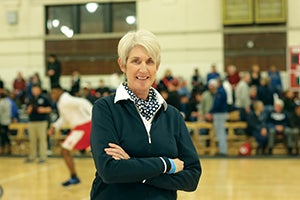features
A CONVERSATION WITH . . .
Amy Backus, director of athletics and chair of physical education
 photo: Ryan Baker
Amy Backus
photo: Ryan Baker
Amy Backus
Amy Backus came to Case Western Reserve University last July with 40 years of athletic credentials. She was a standout high school and Division I college basketball player, a college head basketball coach (combined record 215-205), and, most recently, Yale University's senior associate athletic director. At Case Western Reserve, she leads a division of about 60 people responsible for 19 varsity sports (with 525 student-athletes), 14 club sports, 35 intramural activities and a physical education program that enrolls 1,800 students each semester. She also finds time each summer to race her family's sailboat on Lake Erie.
What's your role as athletic director?
My primary focus is on the experience of our students, whether it's our varsity student-athletes or students in club sports or intramurals. Are they being taught by professionals, and in an ethical way? Are they being developed as people to become good citizens making good decisions? Are they learning leadership skills they might not have had a chance to learn before?
How do you measure that?
Certainly, there are traditional assessment tools of evaluating their experience through surveys and one-on-one discussions. But on a different level, am I seeing the students' potential being tapped into physically and academically? Are their GPAs on track, or are some students having difficulty and need to be directed to other university resources?
At a research university of this caliber, how do students balance their time to compete in sports?
It's amazing to me what they're able to accomplish. But more often than not, students will say their time is better managed and their grades are better when they're in season because they have a more rigid schedule and less time to procrastinate.
You go to nearly all the home events. Do you feel like you have to be there?
No, I want to be there. That's the best part of this job. You sit here at this desk, doing all the preparation and doing all the work, but that's the fun part—watching students compete. Sometimes I'll travel with our teams to make sure I have that connection.
What's the reaction of students when they see you on a bus?
You know what? They love it.
You mentioned ethics earlier. Why such a priority?
I am a major rule follower. I learned from a very young age that you play by the rules.
But not everybody else does, so you could lose.
I don't care. It's that important to me.
How are women's athletics different from when you played?
I was very fortunate that I actually went to a school that was at least a decade ahead in women's athletics. Our athletic director at Central Michigan University [the late Fran Koenig] was the president of the [Association for Intercollegiate Athletics for Women]. That was just as the tide was turning for Title IX [a 1972 federal law that prohibits sex discrimination in education, including sports programs], and it opened my eyes to this whole other world and sort of fighting the good fight.
When did it first occur to you that there were two sets of rules for male and female athletes?
Probably when I was in high school and the girls basketball team got the hand-me-down warm-ups from the boys junior varsity... I knew when I was in college that the guys on the team were getting scholarships. Fran Koenig really was the person who initiated scholarships for women, and Central Michigan was one of the first schools in the state to offer scholarships. I got one of the first in the state—$250 as a sophomore.
This whole issue of equal opportunity for women is very important to you. Where does that come from?
I'm one of four girls [she's the youngest] in my family. We grew up on the lake in Vermilion [Ohio]. My dad was a sailor, and we all got into sailboat racing at a very, very young age. It was unusual for girls to skipper their own boats and to be that competitive. My father always found a way to provide us with a boat to race so we wouldn't have to go crew for a guy. He never articulated it that way, so I just grew up thinking this is just the way it's going to be.






